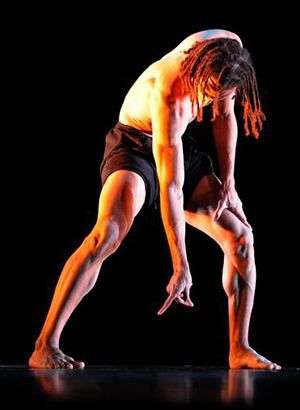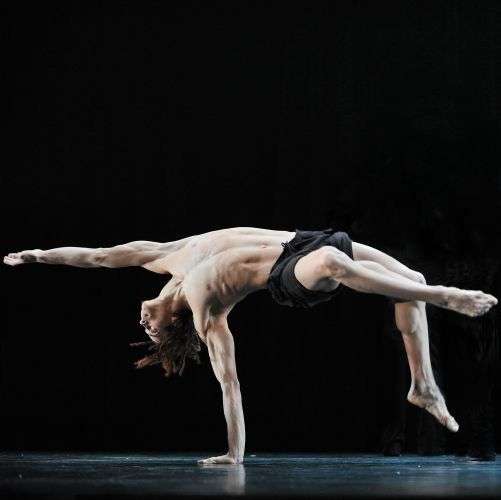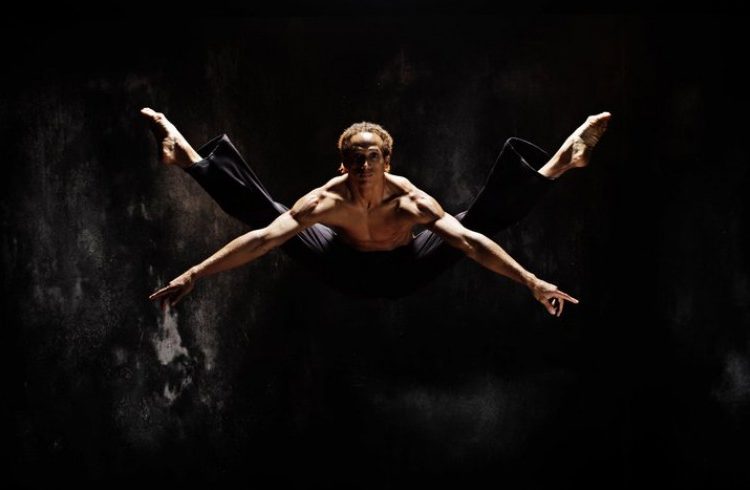Yosmell Calderón danced in Contemporary Dance of Cuba (DCC) for nine years. He was able, during that time, understand and dance at will. Blur in solos and duets extraordinary that (we) left breathless at each exit the stage. Yosmell Calderón is, to be exact, the Compass solo and duos Ne me quitte pas de DemoN / Crazy and El Dorado.
Over his career and his recent separation from the company, he says, has been vital for it served as dancer, Jabao spoke with OnCuba.
“Look, the first time for dancing where’d say very slow, because I was an athlete seven years, and see that my body was interacting with another language, another way to express, with another way of seeing life, it was a shock. My life stopped in a state of feedback from other perspectives, other ways of doing things, until there came a time when my family told me: you do or not, but start and end well, and that was what I most motivated, were words of my grandfather, shocking in my world at that time.
“From there I got much involved with dance, I began to understand it, love it, but every time I danced it was a little cold because it was very technical, I had the skills and abilities that gymnastics had given me and I could occasionally dance with some virtuosity. For three or four years I was dancing many solos, then I got to the National School of Dance, I went to different contests, to Italy, Holland, soloing, and that somehow helped me to understand the space, but everything has its pros and cons, I had a hard time when dancing in group.
 “When I came to DCC I went through another process, the one of understanding a little more the energies of all my colleagues, they had a group work and I also had to establish myself within the parameters or chances that the group gave me, and that was very important in my life, because to me dance is like being a psychologist, understanding a little more to the people, the audience, creating a bond with them. Become more than a dancer or an artist, is self-knowledge of how far you can get, something unique, and dance and martial arts I practice have given that to me. I would not say it is philosophy, but it is the path I follow and that is wonderful. ”
“When I came to DCC I went through another process, the one of understanding a little more the energies of all my colleagues, they had a group work and I also had to establish myself within the parameters or chances that the group gave me, and that was very important in my life, because to me dance is like being a psychologist, understanding a little more to the people, the audience, creating a bond with them. Become more than a dancer or an artist, is self-knowledge of how far you can get, something unique, and dance and martial arts I practice have given that to me. I would not say it is philosophy, but it is the path I follow and that is wonderful. ”
Is there any dance, a show that you have enjoyed in particular?
The first thing I danced was El Dorado, by Cathy Marston, then other works came as DemoN / Crazy by Rafael Bonachela … I enjoy it all, I never particularized some things, do not make them mine, because somehow I have to be dancing the movement created by the choreographers. However, you assimilate all that and when you’re performing you take it as yours and adapt it to your features, your possibilities, that’s distorting the information you have and at the same time saying, it is not me, is the choreographer’s language with whom I am working and see how fascinating is, he has a different perspective of the movement to which we are accustomed, and then you learn to love him”.
Do you feel more comfortable with a choreographer that allows you to improvise ?
“There are choreographers who come and do exactly what they want, there is not a movement in which you can improvise, the accounts are accurate, and that helps you doing what you have to do at the right time, it is like: this is the here and now, enjoy it, learn from me, learn from the time and all the information I am providing you; j ust be a soldier- artist, because you have to understand it as it is and that helps you to be at two hundred percent of your concentration.
“The Cuban dancer tends to improvise a lot, we are very crazy or are always looking for another way to show, but for some choreographers it is the contrary, they try to calm a storm, put all that sea completely flat, appease it all. Then you have to get to that state and work from there. Then you must learn to understand these two types of choreographers. For me, I will not say it’s neither one thing nor the other, because I would be absolutizing. I think it is more about being in the way of those two people, to understand it and take it to you, enjoy it. ”
What is the hardest thing for you when going on stage?
“The hardest on the stage, either Cuban or foreign, is to find the link with the audience for precisely at the moment you are on it that relationship to reach such a level that them to say: I do not want you to leave the stage and that’s what I always try to do. It is not the technicality. Youth thinks a lot about technicality, in how many things they can do or if they can stretch a leg, or think on tiptoe… The most experienced dancer is more for enjoyment, and I think that sometimes does not need thinking about creating that link, because that just emanates and the public receives it. ”
Is there any particular work with which you have accomplished that connection?
“Lately, I think I managed to do it with DemoN / Crazy and Compass. I never knew what level I had achieved in my life as a dancer until somehow after finishing these choreographies people recognized me, and those things made me understanding that I was on the right track. I always tried to take my chances at maximum but I did not think I was in a right way. ”
You leave DCC … what stage begins now in your career?
There are many important things for a dancer. I will not leave DCC ever; I will always maintain the link with the company. But for me the Cuban dancer today, due to geographic fatalism, miss information, and I seek that constantly. In part I have found it for nine years in this company, but at this point in my life I want to find information, whether for hip hop, jazz, contemporary, technical, on the most revolutionary thing that is being done in the world of dance.
“I want to be as an ambassador of all that information and bring it here, and I think in the end I will finish here, settled in Cuba. I like much the changes that are taking place right now in our country and I see it as a chance for me to return, but with that encyclopedia of information I want to find and deliver, maybe not as a dancer, but as a teacher. For now I will start with the company Pál Frenak, from Hungary, with a two years contract. ”

Does any dance figure have inspired you in particular?
“I shared with the best generation of DCC when I entered the company. The first dance I saw in rehearsals was Compass and I was shocked to see the drums and how the dancers were related to the music, especially when improvising, the solo I did later. I cannot explain to you the energy I felt at that moment. Among them, Miguel Altunaga, Wisley Estacholy, a prodigy of dance, wherever you’d put him in the world he’d have been a dancer of great caliber, Osnel Delgado, an excellent dancer with exquisite skills, he could mount a phrase of five minutes in just two … And I said, where am I? I am next to people who are not from this world, and that motivated me to be at the peak of my possibilities, and saying I want to be like them. Also Edson Leonardo Cabrera, who was with whom I learned what performing, is. He told me: you do not have to worry about the performance, it will come out of you when you understand everything you do. They were like the mirror in which I wanted to look at me “.
What do you think contemporary dance in Cuba is missing now?
“Contemporary dance lacks -DCC is working on it, I do not say they are not doing it, but still lacks -that the Cuban dancer to understand he has to be at maximum level. In the world a ballet dancer also dances neoclassical, modern, hip hop, tango or a mixture of all these styles. That does not happen in Cuba. The Cuban dancer has to understand that he must do everything and be prepared for whatever it comes, if you are good in contemporary, that is fine, or in modern, or if you are prepared to make a kind of contact, that is OK. The more information, the better the dancer is.
“F or example, why can the National Ballet of Cuba not do contemporaries, neoclassical, is it a problem of concept, philosophy or approach? That is a limitation to the Cuban dance culture and they should already work on this direction “.
It is said that the life of a dancer is short, have you thought at the time of retirement?
“I have never thought about how I will finish. I have thought I must be prepared for that, and the main thing for me is to have my body in good shape. I know that my body is my instrument, if not abused I can continue dancing until forty, then for me the essential thing in a dancer’s care, is to understand that your body is your language. It comes to strengthen yourself and reach a state in which you know channeling every moment of your life, focused o n a good way and say the trip was wonderful, the goal is not… “










